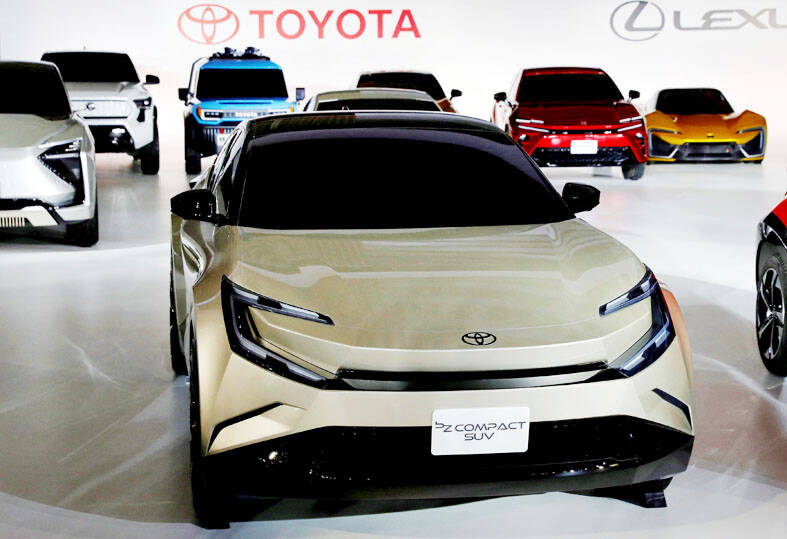General Motors Co (GM) last year overtook Japanese automaker Toyota Motor Corp in US vehicle sales, company figures showed on Wednesday.
GM reclaimed the top spot on strong demand after earlier supply difficulties.
In 2021, the automakers saw a rankings shift with Toyota jumping ahead for the first time as a semiconductors shortage shook the vehicle industry. Assembly lines took a hit, and the two companies saw steep sales declines.

Photo: REUTERS
GM on Wednesday said its sales in the US last year jumped 3 percent to about 2.3 million units.
That was higher than Toyota’s reported annual figure of 2.1 million vehicles.
Nearly half of GM’s sales last year were of full-size pickup trucks and big sports utility vehicles (SUVs), as the company turned to higher-margin vehicles while supply problems spilled over into last year.

Photo: REUTERS
Its Chevrolet Bolt and Bolt EUV electric vehicles also delivered their “best sales year ever,” GM said, adding that it sees opportunities to grow its electric vehicle market share this year.
Meanwhile, Toyota’s US deliveries dropped 9.6 percent for the whole of last year. Sales of its SUVs, an important segment, dropped 8.6 percent.
However, it touted its electrified vehicle sales, saying these made up nearly one-quarter of total sales volume last year.
Full-year sales for the industry last year are forecast at 13.9 million units, market researchers at Cox Automotive Inc said.
That would be a drop from 2021 and lowest since 2011, when total new vehicle sales were recovering from the Great Recession, Cox researchers said.
Meanwhile, sales of new vehicles in the UK last year sank to their lowest level in three decades, plagued by parts shortages and COVID-19-linked supply chain woes, industry data showed yesterday.
The UK’s mainly foreign-owned automakers sold a combined 1.61 million vehicles — the lowest since 1992, data compiled by the Society of Motor Manufacturers and Traders (SMMT) showed.
That marked a 2 percent decline from 2021, when demand was blighted by a COVID-19 pandemic-induced slump and semiconductor shortages.
Nevertheless, Britain reclaimed its position as Europe’s second-biggest vehicle market behind Germany, after being overtaken by France in the past few years, while the SMMT forecast a 15 percent jump in new vehicle sales for this year.
“The automotive market remains adrift of its pre-pandemic performance, but could well buck wider economic trends by delivering significant growth in 2023,” SMMT chief executive Mike Hawes said.
“Looking ahead, supply chains are beginning to stabilize, and although the shortage of semiconductors is expected to ease, erratic supply will likely impact manufacturing throughout 2023,” he said.

TECH BOOST: New TSMC wafer fabs in Arizona are to dramatically improve US advanced chip production, a report by market research firm TrendForce said With Taiwan Semiconductor Manufacturing Co (TSMC, 台積電) pouring large funds into Arizona, the US is expected to see an improvement in its status to become the second-largest maker of advanced semiconductors in 2027, Taipei-based market researcher TrendForce Corp (集邦科技) said in a report last week. TrendForce estimates the US would account for a 21 percent share in the global advanced integrated circuit (IC) production market by 2027, sharply up from the current 9 percent, as TSMC is investing US$65 billion to build three wafer fabs in Arizona, the report said. TrendForce defined the advanced chipmaking processes as the 7-nanometer process or more

China’s Huawei Technologies Co (華為) plans to start mass-producing its most advanced artificial intelligence (AI) chip in the first quarter of next year, even as it struggles to make enough chips due to US restrictions, two people familiar with the matter said. The telecoms conglomerate has sent samples of the Ascend 910C — its newest chip, meant to rival those made by US chipmaker Nvidia Corp — to some technology firms and started taking orders, the sources told Reuters. The 910C is being made by top Chinese contract chipmaker Semiconductor Manufacturing International Corp (SMIC, 中芯) on its N+2 process, but a lack

Who would not want a social media audience that grows without new content? During the three years she paused production of her short do-it-yourself (DIY) farmer’s lifestyle videos, Chinese vlogger Li Ziqi (李子柒), 34, has seen her YouTube subscribers increase to 20.2 million from about 14 million. While YouTube is banned in China, her fan base there — although not the size of YouTube’s MrBeast, who has 330 million subscribers — is close to 100 million across the country’s social media platforms Douyin (抖音), Sina Weibo (新浪微博) and Xiaohongshu (小紅書). When Li finally released new videos last week — ending what has

OPEN SCIENCE: International collaboration on math and science will persevere even if the incoming Trump administration imposes strict controls, Nvidia’s CEO said Nvidia Corp CEO Jensen Huang (黃仁勳) said on Saturday that global cooperation in technology would continue even if the incoming US administration imposes stricter export controls on advanced computing products. US president-elect Donald Trump, in his first term in office, imposed restrictions on the sale of US technology to China citing national security — a policy continued under US President Joe Biden. The curbs forced Nvidia, the world’s leading maker of chips used for artificial intelligence (AI) applications, to change its product lineup in China. The US chipmaking giant last week reported record-high quarterly revenue on the back of strong AI chip